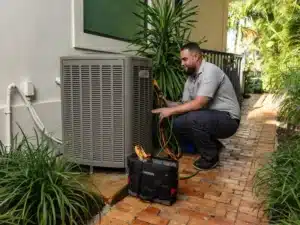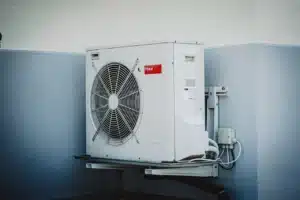The Benefits of Installing a Whole-Home Humidifier
Maintaining the right level of humidity in your home can...
Homeowners in Florida are always looking for ways to stay comfortable while keeping energy costs under control. Air conditioning is not just a luxury here—it is a necessity for much of the year. Traditional heating and cooling systems work, but they often come with high utility bills and frequent maintenance. One option gaining more attention is geothermal HVAC. This technology uses the steady temperature of the ground to heat and cool homes more efficiently than standard systems. Like any major investment, however, it comes with both advantages and disadvantages. Understanding these factors can help Florida homeowners decide if geothermal is the right choice for their property.
Geothermal heating and cooling systems rely on the earth’s consistent underground temperature. Just a few feet below the surface, the ground maintains a steady temperature throughout the year, usually between 55 and 70 degrees depending on location. A geothermal system uses a series of underground pipes, called a loop system, filled with water or refrigerant to transfer heat between the home and the earth.
Because the system relies on the natural temperature of the ground, it requires less energy than forcing air to heat or cool using electricity or gas.
There are several reasons why Florida homeowners consider geothermal systems.
Despite the many benefits, geothermal systems are not perfect for every situation.
In Florida, air conditioning is the primary demand on any HVAC system. Geothermal systems excel in cooling efficiency, which makes them appealing in hot climates. They also manage humidity better, which is a major comfort factor in coastal areas like Tampa Bay, Miami, or Orlando.
However, conventional HVAC systems are less expensive upfront and widely available. They may also be easier to install in homes without the land or access needed for geothermal loops. The choice often comes down to long-term versus short-term priorities.
To help offset costs, homeowners may qualify for financial incentives. Federal tax credits are available for renewable energy systems, including geothermal. Some utility companies also offer rebates or discounts for energy-efficient upgrades. These incentives can make geothermal systems more accessible by lowering the initial financial burden.
Deciding whether to install a geothermal HVAC system requires evaluating several factors:
For homeowners who plan to stay in their home for many years and want to reduce energy bills while improving sustainability, geothermal can be an excellent choice. For those focused on lower upfront expenses or shorter-term living situations, a traditional HVAC system may be more practical.
Geothermal HVAC systems offer a mix of advantages and challenges for Florida homeowners. They provide exceptional efficiency, long lifespans, and reliable comfort, making them an appealing option for those looking to invest in sustainable home systems. At the same time, the higher upfront costs, property requirements, and installation challenges make them less accessible for some households.
Carefully weighing both the benefits and drawbacks allows homeowners to make an informed choice. For those who value long-term energy savings and environmental responsibility, geothermal may be the right solution. For others, sticking with a traditional system might be more practical. In either case, consulting with an experienced HVAC professional can provide insight tailored to the specific needs of the home and family.

Maintaining the right level of humidity in your home can...

Air conditioning is essential in Florida’s hot and humid climate,...

Air conditioning is critical in Florida’s hot and humid climate....

For most Florida homeowners, air conditioning isn’t a luxury—it’s a...

Indoor air quality is a growing concern for many Florida...

Many homeowners in Florida focus on keeping their homes cool...